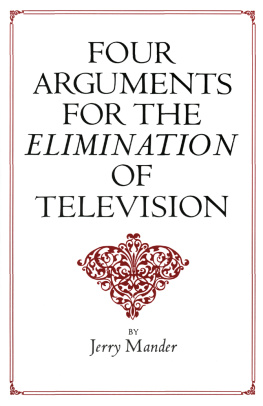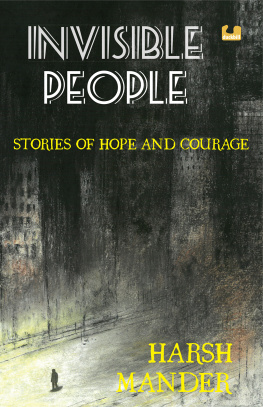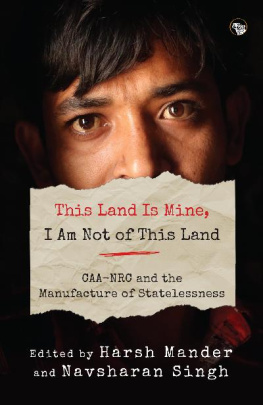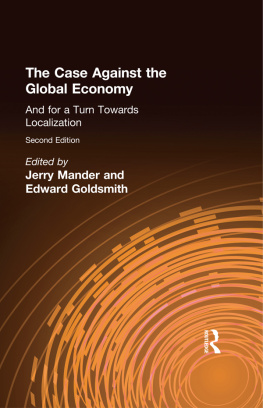Mander - Looking Away
Here you can read online Mander - Looking Away full text of the book (entire story) in english for free. Download pdf and epub, get meaning, cover and reviews about this ebook. year: 2015, publisher: Speaking Tiger Books LLP, genre: Politics. Description of the work, (preface) as well as reviews are available. Best literature library LitArk.com created for fans of good reading and offers a wide selection of genres:
Romance novel
Science fiction
Adventure
Detective
Science
History
Home and family
Prose
Art
Politics
Computer
Non-fiction
Religion
Business
Children
Humor
Choose a favorite category and find really read worthwhile books. Enjoy immersion in the world of imagination, feel the emotions of the characters or learn something new for yourself, make an fascinating discovery.

Looking Away: summary, description and annotation
We offer to read an annotation, description, summary or preface (depends on what the author of the book "Looking Away" wrote himself). If you haven't found the necessary information about the book — write in the comments, we will try to find it.
Mander: author's other books
Who wrote Looking Away? Find out the surname, the name of the author of the book and a list of all author's works by series.
Looking Away — read online for free the complete book (whole text) full work
Below is the text of the book, divided by pages. System saving the place of the last page read, allows you to conveniently read the book "Looking Away" online for free, without having to search again every time where you left off. Put a bookmark, and you can go to the page where you finished reading at any time.
Font size:
Interval:
Bookmark:
About the book:
This feeble blemished light, this dawn mangled by night, This is not the morning we had all so longed for...Faiz Ahmed Faiz
In the two decades since the early 1990s, when India confirmed its allegiance to the Free Market, more of its citizens have become marginalized than ever before, and society has become more sharply riven than ever.
In Looking Away , Harsh Mander ranges wide to record and analyse the many different fault lines which crisscross Indian society today.
There is increasing prosperity among the middle classes, but also a corresponding intolerance for the less fortunate. Poverty and homelessness are also on the riseboth in urban and rural settingsbut not only has the state abandoned its responsibility to provide for those afflicted, the middle class, too, now avoids even the basic impulses of sharing. And with the sharp Rightward turn in politics, minority communities are under serious threattheir very status as citizens in questionas a belligerent, monolithic idea of the nation takes the place of an inclusive, tolerant one.
However, as Harsh Mander points out, what most stains society today is the erosion in the imperative for sympathy, both at the state and individual levels, a crumbling that is principally at the base of the vast inequities which afflict India. Exhaustive in its scope, impassioned in its arguments, and rigorous in its scholarship, Looking Away is a sobering checklist of all the things we must collectively get right if India is to become the country that was promised, in equal measure, to all its citizens.
About the author:
Harsh Mander, writer, human rights worker, columnist, researcher and teacher, works with survivors of mass violence and hunger as well as with homeless persons and street children. His books include Unheard Voices: Stories of Forgotten Lives, The Ripped Chest: Public Policy and the Poor in India, Fear and Forgiveness: The Aftermath of Massacre, Fractured Freedom : Chronicles from Indias Margins, Untouchability in Rural India (co-authored), Living with Hunger and Ash in the Belly : Indias Unfinished Battle against Hunger. He regularly writes columns for The Hindu, Hindustan Times and Mint , and contributes frequently to scholarly journals. His stories have been adapted for films, such as Shyam Benegals Samar and Mallika Sarabhais dance drama Unsuni .

~
A trenchant account of India in the thrall of wealth accumulation and increasing inequality.
Deborah K. Padgett, professor, New York University
Looking Away tries to understand how inequality without outrage has become a defining marker of Indian society. It describes in searing detail the many forms of discrimination and injustice that result from the absence of empathy for those without the advantages of birth. There are shocking individual stories, but also stories of survival, extraordinary courage and individual compassion that provide some glimmers of hope.
Jayati Ghosh, professor, Jawaharlal Nehru University
Slippage in shared sense of civic responsibility, loss of confidence that government can make a difference, the transit of mass homelessness from scandal to fact of urban life, criminalized indigent survival strategies, vigorous efforts at misery-cleansing of streets before international events, invisible structural violence, class-segregated living spaces, disadvantage that means exile from hope, waning moral outrage at steadily mounting evidence of social inequality: all these and more make Looking Away an instructive, recursive read.
Kim Hopper, author, Reckoning with Homelessness
Harsh Mander tells the wrenching story of poverty and exclusion in the midst of plenty, and paints an even more distressing story of the studied indifferences of Indias new prosperous class. The work of a compassionate pragmatist with a lifetime of experience working within and outside the state, Looking Back also explores the policies, the politics, the lessons and maybe more importantly, the values that could pave the path for a more inclusive India.
Patrick Heller, professor, Brown University
An important and evocative book, written with passion, about the challenges of rising inequality in India today, which are compounded by the astonishing indifference of people of privilege to pervasive injustice and suffering around them, and the wide sway of prejudice in the middle classes against vulnerable groups.
Zoya Hasan, professor, Jawaharlal Nehru University

To
Shahid Azmi,
and to
Indias three million street children
who survive our cruelty, betrayal and indifference
with bare-faced courage, cheeky spirit and resilience
~
This feeble blemished light, this dawn mangled by night,
This is not the morning that we had so longed for
Faiz Ahmed Faiz
Never, never be afraid to do what is right.
Societys punishments are small compared to the wounds we
inflict on our souls when we look away.
Martin Luther King Jr
CONTENTS
IN FEEBLE LIGHT
I sometimes wonder how I would describe todays India if I were a historian writing a hundred years from now.
I would write, first, that the paramount marker of the first decade of twenty-first-century India was the extraordinary indifference that people of privilege had for the intense and pervasive levels of human suffering all around them.
In an interview he gave in the middle of 2013, philosopher and public intellectual Noam Chomsky observed that Indias misery and oppression are so striking, much worse than in any country I have ever seen. And it is so dramatic.
There is indeed a startling absence of compassion among a majority of well-to-do Indians towards the millions who have no advantages of birth to shield them from hunger, oppression, violence, squalor and humiliation. A dispassionate external observer would be bewildered by middle-class Indias capacity to look away when confronted with enormous injustice and suffering; by our societys cultural comfort with inequality. That the accident of where a child is born still determines her chances in life almost irrevocablywhether and how long she would be able to study, and with what quality, the vocations open to her, the limits of her wealth and social standing, even her most basic well-being and dignityis widely considered unproblematic, even legitimate. Many people of wealth and privilege are convinced that they have what they do because they deserve it, and that those who are in want and need also deserve their lotbecause of laziness, addiction to drink, lack of education, lack of ambition, low capabilities in general, and the profligate breeding of large families.
The second-most striking marker of this age that I would record, looking back on India a century later, would be the legitimization of prejudice and discrimination against people of minority faiths and cultures and people whose life choices differ from those of the majority.
Since the early 1990s, there has been an erosion, among significant sections of the middle class, of our traditions of pluralism and the lived acceptancehowever imperfectof diversity. People of minority communities are subjected to bigotry, intolerance and open hostility. Large sections of the elite and middle classes are also unapologetically prejudiced against people of lower castes, residents of urban slums, people from ethnically distinct regions of the country like the Northeast, working-class migrants from poor states like Bihar, coloured people, sexual minorities and many others who differ in whichever way from the mainstream.
Next pageFont size:
Interval:
Bookmark:
Similar books «Looking Away»
Look at similar books to Looking Away. We have selected literature similar in name and meaning in the hope of providing readers with more options to find new, interesting, not yet read works.
Discussion, reviews of the book Looking Away and just readers' own opinions. Leave your comments, write what you think about the work, its meaning or the main characters. Specify what exactly you liked and what you didn't like, and why you think so.






